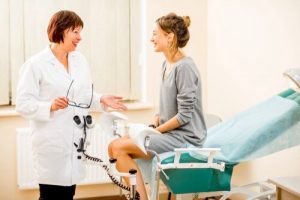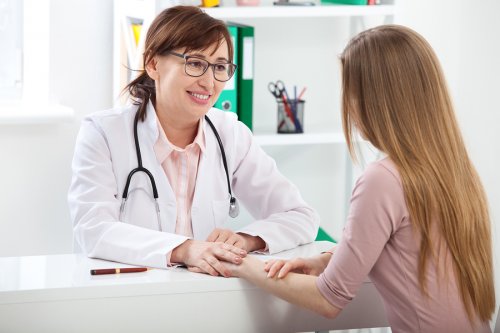When to Make Your First Visit with the Gynecologist

For young women, the first visit with the gynecologist may represent the most difficult test of adolescence. Every woman endures uncomfortable situations in life, and gynecological check-ups certainly qualify.
During the visit, nerves set in and questions abound. The way women respond to this challenge every year is highly courageous.
A sense of uncertainty can make the first visit even more terrifying. Going to the gynecologist for the first time involves overcoming embarrassment and adopting a preventative attitude toward one’s health.
When should young women make their first visit with the gynecologist?
From an early age, women need to know that visits to the gynecologist are important to prevent possible future illnesses. For this reason, it’s recommended that the first visit with the gynecologist take place between 13 and 15 years of age.
The initial visit can be dedicated to simply meeting the doctor and preparing the medical history. From there, plans for the next appointment can be made.
Generally, a physical examination isn’t necessary at the outset, unless there is an issue related to sex, menstruation, or symptoms or pain stemming from an infection.
The examinations that take place during these appointments are important to the monitoring of the optimal development and function of the body, as well as disease prevention. Young women should understand the importance of gynecological care, and make it a habit.

Examinations during a gynecological appointment
1. Pelvic exam
The purpose of this complete examination of the reproductive organs is to rule out any problems.
The doctor examines the outer part of the vulva, and uses a device called a speculum to open the vaginal walls and examine the inner part of the vulva. There is also a manual examination (with gloves) that touches the internal organs.
If you haven’t had sexual intercourse yet, a special speculum is used to make it as comfortable as possible.
Pelvic exams don’t represent a risk in terms of losing one’s virginity, since the membranes located in the vagina and hymen are already open, and allow for enough room for the examination to take place.
For a teenager, this can be a truly uncomfortable situation. Therefore, it’s a good idea to practice deep breathing or relaxation exercises in order to minimize the discomfort.
2. Cytology
This is a special test for detecting abnormal or pre-cancerous cells in the lower part of the uterus. It can also help to detect any infections.
Firstly, the gynecologist performs the test in a similar manner to the pelvic exam, introducing a small brush to take cell samples. The doctor then sends them to a lab for further testing.
“It is recommended that the first check-up take place between 13 and 15 years of age.”
3. Mammary exam
This is part of a routine gynecological check-up. Although breast cancer is unlikely in young women, it’s important for the doctor to verify that everything is in perfect condition.
This exam can detect abnormal lumps associated with benign conditions, such as fibroadenomas, or asymmetrical irregularities in the breasts.
4. Ultrasound
The test allows the doctor to view all the internal pelvic organs. The purpose here is to rule out ovarian cysts and malformations of the uterus.
Depending on the patient’s age, the doctor can opt between a vaginal probe or imaging through the stomach. For this exam, it’s also a good idea to have a full bladder.
5. Vaccines
These injections help protect against diseases caused by bacteria and viruses. It’s a good idea to take your vaccination card with you, as the majority take place on official vaccination days.
The most highly recommended vaccines include the boosters for tetanus, HPV, and hepatitis B. Furthermore, the HPV vaccine helps prevent two types of HPV, which are associated with cervical cancer. The vaccine is administered in three series over a period of six months.

Reproductive health recommendations
In addition to gynecologist appointments, young women should consider other recommendations to keep their reproductive organs in good health. These include:
- Living a healthy lifestyle free of stress and worry.
- Maintaining a good weight, with a diet rich in vitamins, and also low in calories and sugars.
- Avoiding drugs, cigarettes, and alcohol.
- Using contraceptives when having sex.
- Avoiding promiscuity.
- Having a gynecological check-up at least once a year.
- Doing physical activities, or practicing a sport.
By maintaining a healthy lifestyle and being responsible about annual gynecological check-ups, you can prevent many serious diseases from an early age.
For this reason, young women need early education so that their first visit with the gynecologist doesn’t represent a scary experience.
For young women, the first visit with the gynecologist may represent the most difficult test of adolescence. Every woman endures uncomfortable situations in life, and gynecological check-ups certainly qualify.
During the visit, nerves set in and questions abound. The way women respond to this challenge every year is highly courageous.
A sense of uncertainty can make the first visit even more terrifying. Going to the gynecologist for the first time involves overcoming embarrassment and adopting a preventative attitude toward one’s health.
When should young women make their first visit with the gynecologist?
From an early age, women need to know that visits to the gynecologist are important to prevent possible future illnesses. For this reason, it’s recommended that the first visit with the gynecologist take place between 13 and 15 years of age.
The initial visit can be dedicated to simply meeting the doctor and preparing the medical history. From there, plans for the next appointment can be made.
Generally, a physical examination isn’t necessary at the outset, unless there is an issue related to sex, menstruation, or symptoms or pain stemming from an infection.
The examinations that take place during these appointments are important to the monitoring of the optimal development and function of the body, as well as disease prevention. Young women should understand the importance of gynecological care, and make it a habit.

Examinations during a gynecological appointment
1. Pelvic exam
The purpose of this complete examination of the reproductive organs is to rule out any problems.
The doctor examines the outer part of the vulva, and uses a device called a speculum to open the vaginal walls and examine the inner part of the vulva. There is also a manual examination (with gloves) that touches the internal organs.
If you haven’t had sexual intercourse yet, a special speculum is used to make it as comfortable as possible.
Pelvic exams don’t represent a risk in terms of losing one’s virginity, since the membranes located in the vagina and hymen are already open, and allow for enough room for the examination to take place.
For a teenager, this can be a truly uncomfortable situation. Therefore, it’s a good idea to practice deep breathing or relaxation exercises in order to minimize the discomfort.
2. Cytology
This is a special test for detecting abnormal or pre-cancerous cells in the lower part of the uterus. It can also help to detect any infections.
Firstly, the gynecologist performs the test in a similar manner to the pelvic exam, introducing a small brush to take cell samples. The doctor then sends them to a lab for further testing.
“It is recommended that the first check-up take place between 13 and 15 years of age.”
3. Mammary exam
This is part of a routine gynecological check-up. Although breast cancer is unlikely in young women, it’s important for the doctor to verify that everything is in perfect condition.
This exam can detect abnormal lumps associated with benign conditions, such as fibroadenomas, or asymmetrical irregularities in the breasts.
4. Ultrasound
The test allows the doctor to view all the internal pelvic organs. The purpose here is to rule out ovarian cysts and malformations of the uterus.
Depending on the patient’s age, the doctor can opt between a vaginal probe or imaging through the stomach. For this exam, it’s also a good idea to have a full bladder.
5. Vaccines
These injections help protect against diseases caused by bacteria and viruses. It’s a good idea to take your vaccination card with you, as the majority take place on official vaccination days.
The most highly recommended vaccines include the boosters for tetanus, HPV, and hepatitis B. Furthermore, the HPV vaccine helps prevent two types of HPV, which are associated with cervical cancer. The vaccine is administered in three series over a period of six months.

Reproductive health recommendations
In addition to gynecologist appointments, young women should consider other recommendations to keep their reproductive organs in good health. These include:
- Living a healthy lifestyle free of stress and worry.
- Maintaining a good weight, with a diet rich in vitamins, and also low in calories and sugars.
- Avoiding drugs, cigarettes, and alcohol.
- Using contraceptives when having sex.
- Avoiding promiscuity.
- Having a gynecological check-up at least once a year.
- Doing physical activities, or practicing a sport.
By maintaining a healthy lifestyle and being responsible about annual gynecological check-ups, you can prevent many serious diseases from an early age.
For this reason, young women need early education so that their first visit with the gynecologist doesn’t represent a scary experience.
All cited sources were thoroughly reviewed by our team to ensure their quality, reliability, currency, and validity. The bibliography of this article was considered reliable and of academic or scientific accuracy.
- de Morais, S; Taquette, S. La consulta ginecológica en la adolescencia bajo la óptica de médicos ginecólogos de la ciudad de Río de Janeiro. REV CHIL OBSTET GINECOL 2011; 76(5): 311 – 317. [Documento en línea] Disponible en: https://scielo.conicyt.cl/pdf/rchog/v76n5/art05.pdf
- Sociedad Española de Ginecología y Obstetricia. Exploración ginecológica en niñas y adolescentes. [Documento en línea] Disponible en: https://sego.es/mujeres/Exploracion_ninas.pdf
This text is provided for informational purposes only and does not replace consultation with a professional. If in doubt, consult your specialist.








